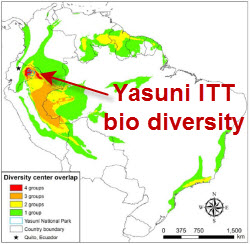Rights of Nature Tribunal
[yframe url=’http://www.youtube.com/watch?v=LrD7CdQMA6g’]
 Review Yasuni ITT Case presented by Carlos Larrea, Ecuador
Review Yasuni ITT Case presented by Carlos Larrea, Ecuador
Ecuador ‘s decision to exploit the oil fields ITT Block, mostly located within the Yasuni National Park, taken from August 15, 2013 , constitutes a serious threat to the conservation and integrity of the exceptional biodiversity of Yasuní National Park. The rights of ecosystems to exist and flourish, enshrined in the Ecuadorian constitution, may be affected by the exploitation of oil in the ITT block.
Threats of oil exploitation in the ITT project not only biodiversity, but also affect the survivals of uncontacted peoples Tagaere and Taromentane, surviving in the primary forest. Recent studies, such as the renowned anthropologist Laura Rival, University of Oxford, documenting the severity of this threat.
Alberto Acosta, economist and former President of Constitutional Assembly
Alberto Acosta studied Energy Economics, Economic Geography, Industrial Economics and Business Administration at the University of Cologne in Germany. These studies enabled him to work as a consultant for the American Institute for Social Research ILDIS (Friedrich Ebert Foundation) and to lead this organization’s project to analyze the economic situation of Ecuador. One of the main outcomes of this investigation related to the external debt. He has taught undergraduate and graduate courses at universities in Quito, Guayaquil and Cuenca, in Ecuador, and the Universidad Complutense of Madrid in Spain. Since November 2008 he has worked as a researcher and professor at FLACSO. Before that, he was Minister of Energy and Mines (January- June 2007) and President of the Constituent Assembly (November 2007 – June 2008). For the 2013 elections, Acosta ran for president by the Unidad Plurinacional de las Izquierdas. Acosta has participated as panelist at national and international conferences and is the author of numerous articles, books and book chapters.
Estudió Economía de la Energía, Geografía Económica, Economía Industrial y Administración de Empresas en la Universidad de Colonia en Alemania. Esta capacitación le abrió las puertas para trabajar como consultor del Instituto Latinoamericano de Investigaciones Sociales ILDIS (Fundación Friedrich Ebert) y para liderar el proyecto de Análisis de Coyuntura Económica del ILDIS – FES. Una de sus principales contribuciones en esta etapa fue el estudio de la deuda externa. Su experiencia lo llevó a ejercer cátedra en universidades de pregrado y posgrado en Quito, Guayaquil y Cuenca, en Ecuador, y en la Universidad Complutense de Madrid, en España. Desde noviembre del 2008 se desempeña como profesor investigador de la FLACSO. Pero antes, fue Ministro de Energía y Minas (enero- junio de 2007) y Presidente de la Asamblea Constituyente (noviembre de 2007-junio de 2008). Fue candidato a la presidencia de Ecuador para las elecciones de 2013 por la Unidad Plurinacional de las Izquierdas. Acosta ha participado como panelista en conferencias nacionales e internacionales y es autor de múltiples aportes en libros colectivos e individuales.
